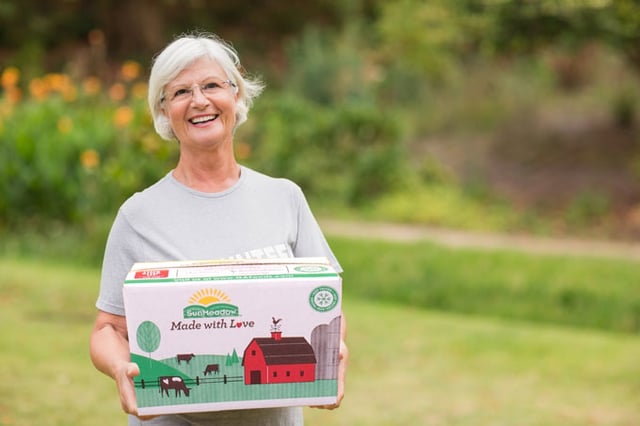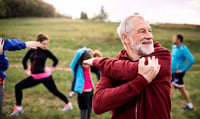The Benefits of Volunteering: Senior Volunteers Enjoy a Better Quality of Life
Volunteering is altruistic– a gift we give to others. Research reveals it’s also something great we do for ourselves! The benefits of volunteering are varied and even more pronounced for senior volunteers.
Senior volunteers are already more motivated than many of their younger community members. Therefore, senior volunteer recruitment and senior quality of life is a perfect match.
Socioemotional Selectivity Theory (SST)
Before reviewing the evidence, it’s helpful to understand Socioemotional Selectivity Theory as it applies to the findings included in this review.
Socioemotional selectivity theory is a life span theory of motivation developed by Stanford psychologist Laura L. Carstensen. The theory maintains that most people become increasingly selective, investing greater resources in emotionally significant activities and goals as their "time horizon" shrinks. Based on the theory, motivational shifts, also, influence cognitive processing.
Many senior volunteers may be drawn to volunteering, in part, because of feelings related to SST. A review of the research draws consistent correlations between seniors volunteering and improved sense of self and the world around them.
The Gerontologist Study: Senior Volunteers Feel Better
A study by The Gerontologist found that volunteering positively affects the volunteer’s self-esteem, personal growth, and social activity.
Subjects performed an average of 6 hours of volunteer work each week in various capacities. With 200 volunteers of diverse economic and cultural backgrounds, the uniting factor is all of the volunteers were 50 or older.
Participants reported that they appreciated a better quality of life from boosted social activity and a feeling of productivity.
Those working in organizations with ample training and support felt the best, which illustrates the importance of valuing and empowering volunteers. This benefits both the organization and the individuals donating their time and assists with volunteer retention.
The researchers followed up with the volunteers a year later; asking participants about their mental and physical health along with the "socioemotional benefits" they believed they gained from volunteering, such as their self esteem, personal growth, and personal activity.
Responses revealed that the volunteers perceive significant improvements in their psychological health. Additionally, senior volunteers experience other socioemotional benefits ranging from a much better sensation of productivity to increased social activity to a general sense that their life had improved.
The Corporation for National and Community Service: Senior Volunteers Enjoy Better Mental and Physical Health
Another body of research on this topic emerges from the Corporation for National and Community Service. Their review shows that volunteers over the age of 55 report longer lives, the absence of depression, increased physical ability, and a general sense of well-being.
Active senior volunteers live longer, healthier lives according to data researchers reviewed. In fact, “The effects of volunteering were found to be greater than other factors including income, education level, or marriage.” (Morrow-Howell et al., 2003)
The organization's report draws 2 key takeaways from the data they reviewed.
- Senior volunteers frequently live longer and report less disability.
- Volunteering can be a part of a healthier lifestyle.
AARP: Volunteering Reduces Depression Among Seniors
A statement released by the AARP proves that seniors who volunteer stave off depression and experience improved mood and outlook on life. Volunteering also reduced their sense of anxiety, as well as increased their perception of their physical health. All volunteers studied participated in the Senior Corps program.
Senior Corps is led by the Corporation for National and Community Service (CNCS), a federal agency for service, volunteering, and civic engagement. To look at the health advantages of volunteering for older adults, CNCS launched 2 longitudinal studies in 2015 that assess the impact of service on their Foster Grandparent and Senior Companion programs. Researchers found:
- Nearly two thirds of Senior Corps volunteers reported a decrease in feelings of isolation and 67% of those who first reported they "often" lack companionship stated they now enjoy improved social connections.
- 70% of volunteers who initially reported at least 5 signs of depression reported significantly fewer symptoms at the conclusion of the very first year of volunteering.
- 63% of volunteers who initially indicated 3 or 4 symptoms of depression reported significantly fewer symptoms after one year as well.
These findings are similar to the Gerontologist and CNCS reviews, providing additional perspective into these positive impressions and the benefits of seniors serving seniors.
Implications and Recommendations
The CNCS provides some research implications and recommendations at the end of their report.
The CNCS concludes that efforts must be put forth to engage populations that can gain most from volunteering because of the good health benefits associated with it. Demographics that may benefit most from this are those underrepresented among current volunteers, including low income individuals and individuals with disabilities. Programs like Senior Corps that offer very small stipends or perhaps reimbursements for transportation or any other expenses associated with volunteering make it easy for large numbers of older volunteers to serve others in their local area. Volunteering can offer a sense of purpose and future outreach should consist of older adults undergoing transitions like unemployment, retirement, or perhaps the loss of a spouse.
Additionally, for those in rural areas, volunteering can offer a crucial way to stay connected and active. Programs for older Americans should consist of volunteer opportunities in outlying areas as well as consider ways to reduce reasons seniors can’t volunteer. An example of this is stipends that can reimburse the price of transportation.
The CNCS goes on to say that as the Baby Boomers generation approaches retirement age, nonprofits and community organizations have to be prepared to recruit and retain baby boomer volunteers. Adoption of key practices, like considerate pairing of volunteers with challenging and appropriate assignments, offering professional development opportunities for volunteers, and dealing with volunteers as valued partners, can help build organizational capacity to recruit and retain boomer volunteers.
While marketing and recruitment efforts directed toward older volunteers should reference the possible health benefits of volunteering, researchers should consider designing health interventions based on volunteering, accordingto the CNCS. They suggest national service holidays as excellent opportunities to feature in marketing to engage new volunteers.
Therefore, merging the interests of service organizations who need volunteers and seniors who want a better quality of life won't just help solve community problems, but could, at the same time, enhance the wellness of the increasing number of older adults.











